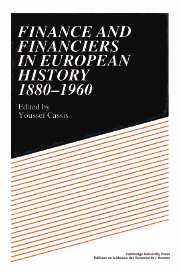Book contents
- Frontmatter
- Contents
- List of figures
- List of tables
- Preface
- 1 Introduction: the weight of finance in European societies
- 2 Banking and industrialization: Rondo Cameron twenty years on
- Part I FINANCIAL SECTOR AND ECONOMY
- Part II FINANCIAL ELITES AND SOCIETY
- Part III FINANCIAL INTERESTS AND POLITICS
- Part IV FINANCE AND FINANCIERS IN SMALLER EUROPEAN COUNTRIES
- Part V THE RISE OF EXTRA-EUROPEAN FINANCIAL CENTRES
- 19 Money and power: the shift from Great Britain to the United States.
- 20 The Yokohama Specie Bank during the period of the restored gold standard in Japan (January 1930–December 1931)
- 21 International financial centres in Asia, the Middle East and Australia: a historical perspective
- 22 Extra-European financial centres: comments
- Index
19 - Money and power: the shift from Great Britain to the United States.
Published online by Cambridge University Press: 12 January 2010
- Frontmatter
- Contents
- List of figures
- List of tables
- Preface
- 1 Introduction: the weight of finance in European societies
- 2 Banking and industrialization: Rondo Cameron twenty years on
- Part I FINANCIAL SECTOR AND ECONOMY
- Part II FINANCIAL ELITES AND SOCIETY
- Part III FINANCIAL INTERESTS AND POLITICS
- Part IV FINANCE AND FINANCIERS IN SMALLER EUROPEAN COUNTRIES
- Part V THE RISE OF EXTRA-EUROPEAN FINANCIAL CENTRES
- 19 Money and power: the shift from Great Britain to the United States.
- 20 The Yokohama Specie Bank during the period of the restored gold standard in Japan (January 1930–December 1931)
- 21 International financial centres in Asia, the Middle East and Australia: a historical perspective
- 22 Extra-European financial centres: comments
- Index
Summary
In 1900 Great Britain held sway as the predominant financial power in the world, a position which both supported and symbolized her international political and strategic power. In 1980 the United States held sway as the predominant financial power, a position which likewise supported and symbolized her super-power status. In both cases, however, an ultimately successful financial competitor was close behind. For Britain the First World War accelerated the process of comparative financial decline, while the Second World War consolidated and confirmed it; for the US, the causes of decline in her turn were more diverse and probably more controllable, but the outcome threatens to be similar as, slowly but ineluctably, the US is superseded by Japan as the predominant financial power. Few would object to this bare summary: confusion only arises when attempting to ascertain what it all means. It is necessary, for example, to distinguish between public and private money: does the term ‘financial power’ refer to private money controlled by bankers and private investors, or public money controlled by governments? Does ‘financial power’ exist if abundant private money cannot be directed according to government policy? Both resources and will are required to exercise effective power, and therefore it can be argued that during certain periods, such as the 1920s, the US was a potential rather than actual financial power, willing to act negatively but not positively. Secondly, both ability and will varied between wartime and peacetime. Until 1945, both the American and the British governments largely restricted the utilization of public money as a weapon to wartime; only thereafter was indicative guidance of bankers replaced by direct flows of public money to other countries.
- Type
- Chapter
- Information
- Finance and Financiers in European History 1880–1960 , pp. 359 - 370Publisher: Cambridge University PressPrint publication year: 1991
- 1
- Cited by



